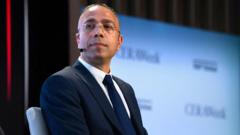COP29's credibility faces challenge as its chief executive reportedly engages in fossil fuel deal discussions
COP29 Leader Caught in Controversial Fossil Fuel Deal Talks

COP29 Leader Caught in Controversial Fossil Fuel Deal Talks
Secret recordings reveal COP29 chief Elnur Soltanov promoting oil and gas investments
In a shocking revelation, Elnur Soltanov, chief executive of Azerbaijan's COP29 climate summit, has been filmed discussing potential fossil fuel deals, prompting backlash from climate advocates. Secretly recorded conversations reveal Soltanov, who also serves as deputy energy minister and board member of state-owned Azerbaijan energy company Socar, expressing interest in attracting investments into gas fields and oil production.
In the footage, obtained by the BBC through undercover investigation by the human rights organization Global Witness, Soltanov is shown setting up a meeting with a representative posing as a potential investor from a fictitious Hong Kong firm. During the conversation, he positioned Azerbaijan as a land of opportunities, suggesting that not only energy companies but any stakeholders could propose solutions for the climate crisis.
Despite the COP29 summit's aim of addressing climate change and moving away from hydrocarbons, Soltanov openly discussed the development of fossil fuel resources. He also labeled natural gas as a "transitional fuel," indicating a willingness to maintain oil and gas production far into the future. This stance is in stark contrast to global climate goals, which dictate a transition away from fossil fuels to combat climate change effectively.
Former UN climate chief Christiana Figueres condemned Soltanov's actions, calling them a "betrayal" of the COP process. The UN Framework Convention on Climate Change's standards of conduct for COP officials demand impartiality and independence, standards Soltanov’s conduct may have undermined.
The integrity of COP29 is now under scrutiny, especially following similar controversies stemming from COP28's host, the UAE, which also faced allegations of leveraging the summit for oil deals. As the world's attention turns to Baku for COP29, the unfolding situation raises critical questions about the motivations behind climate negotiations and the role of oil-producing nations in genuine climate action.
With COP29 set to convene, stakeholders and participants alike will need to grapple with the implications of these disturbing revelations, which may strain efforts to achieve global consensus on combating climate change and transitioning to sustainable energy solutions.
In the footage, obtained by the BBC through undercover investigation by the human rights organization Global Witness, Soltanov is shown setting up a meeting with a representative posing as a potential investor from a fictitious Hong Kong firm. During the conversation, he positioned Azerbaijan as a land of opportunities, suggesting that not only energy companies but any stakeholders could propose solutions for the climate crisis.
Despite the COP29 summit's aim of addressing climate change and moving away from hydrocarbons, Soltanov openly discussed the development of fossil fuel resources. He also labeled natural gas as a "transitional fuel," indicating a willingness to maintain oil and gas production far into the future. This stance is in stark contrast to global climate goals, which dictate a transition away from fossil fuels to combat climate change effectively.
Former UN climate chief Christiana Figueres condemned Soltanov's actions, calling them a "betrayal" of the COP process. The UN Framework Convention on Climate Change's standards of conduct for COP officials demand impartiality and independence, standards Soltanov’s conduct may have undermined.
The integrity of COP29 is now under scrutiny, especially following similar controversies stemming from COP28's host, the UAE, which also faced allegations of leveraging the summit for oil deals. As the world's attention turns to Baku for COP29, the unfolding situation raises critical questions about the motivations behind climate negotiations and the role of oil-producing nations in genuine climate action.
With COP29 set to convene, stakeholders and participants alike will need to grapple with the implications of these disturbing revelations, which may strain efforts to achieve global consensus on combating climate change and transitioning to sustainable energy solutions.






















